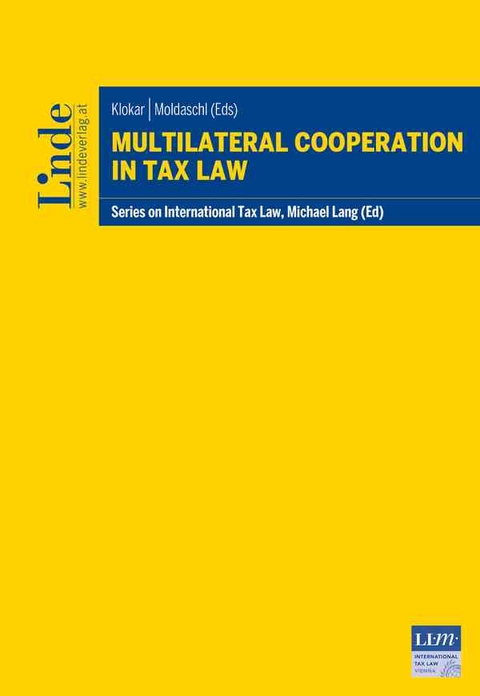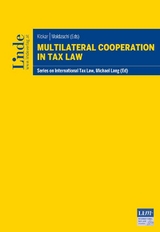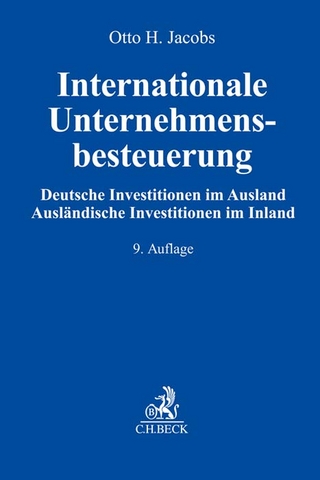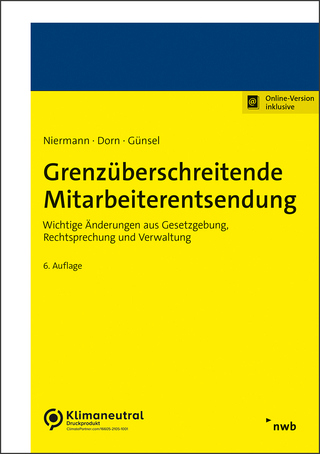Multilateral Cooperation in Tax Law
Linde Verlag Ges.m.b.H.
978-3-7073-4816-3 (ISBN)
This volume aims to develop academic insights, provide practical guidance, and enable an in-depth analysis of the specific aspects of "Multilateral Cooperation in Tax". The chapters focus on an analysis with regard to possibilities for improvement and an outlook on future development opportunities.
An in-depth analysis of various aspects of multilateral cooperation in tax law
Tax evasion and aggressive tax planning causing base erosion and profit shifting (BEPS) has been a widely discussed topic among academics and tax policy makers over the past decades. Increasing globalization and digitalization have contributed to the intensification of this issue in recent years. At the same time, states continue to largely insist on their sovereignty in the area of tax law. However, due to their cross-border nature, issues related to BEPS are shared problems among the states and can typically not be solved by a single nation. Therefore, multilateral cooperation represents an option to build a bridge between the states' demand for sovereignty and the problems caused by BEPS. In this regard, the OECD, the UN, and the EU play an important role in introducing international tax standards in an attempt to effectively address tax evasion and aggressive tax planning in many ways. The interaction and cooperation between different international, supranational (EU), and regional organizations is an ongoing process. In this context, the topic "Multilateral Cooperation in Tax Law" was selected as the general topic for the master's theses of the part-time 2021-23 class of the postgraduate LL.M. programme in International Tax Law at WU (Vienna University of Economics and Business).
This volume aims to develop academic insights, provide practical guidance, and enable an in-depth analysis of various aspects of this topic. The book is divided into four parts. The first part deals with a general overview of the understanding of multilateral cooperation, the background that led to the need for multilateral cooperation and the different stakeholders that play a relevant role in it. While the chapters included in the second part focus on the most important developments on an international level (OECD and UN), the chapters encompassed in the third part analyse the multilateral cooperation initiatives of the EU. Finally, the chapters included in part four deal with selected issues related to multilateral cooperation in tax law, including mutual assistance and exchange of information, dispute resolution mechanisms, and measures in digitalized businesses.
Martin Klokar berät Klienten und Berater im Steuerrecht, spezialisiert auf Fragen bei grenzüberschreitenden Sachverhalten und Fällen der internationalen Doppelbesteuerung sowie im Ertrags- und Immobiliensteuerrecht. Zudem ist er Faculty-Mitglied im Rahmen des postgradualen LL.M.-Programms „International Tax Law“ sowie Lehrbeauftragter am Institut für Österreichisches und Internationales Steuerrecht der WU Wien, an dem er zuvor als Universitätsassistent lehrte und forschte. Er ist Autor zahlreicher Fachpublikationen im österreichischen, europäischen und internationalen Steuerrecht sowie Fachvortragender (u.a. an der Akademie der Steuerberater:innen und Wirtschaftsprüfer:innen).
Katharina Moldaschl ist Wissenschaftliche Mitarbeiterin am Institut für Österreichisches und Internationales Steuerrecht der WU Wien.
| Erscheinungsdatum | 05.10.2023 |
|---|---|
| Reihe/Serie | Schriftenreihe zum Internationalen Steuerrecht ; 135 |
| Sprache | englisch |
| Maße | 155 x 225 mm |
| Gewicht | 610 g |
| Einbandart | kartoniert |
| Themenwelt | Recht / Steuern ► EU / Internationales Recht |
| Recht / Steuern ► Steuern / Steuerrecht ► Internationales Steuerrecht | |
| Schlagworte | EU law • Internationales Steuerrecht • internationale Steuerabkommen • International Tax Law • OECD • Vereinte Nationen |
| ISBN-10 | 3-7073-4816-4 / 3707348164 |
| ISBN-13 | 978-3-7073-4816-3 / 9783707348163 |
| Zustand | Neuware |
| Informationen gemäß Produktsicherheitsverordnung (GPSR) | |
| Haben Sie eine Frage zum Produkt? |
aus dem Bereich




